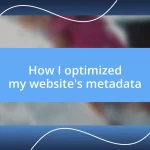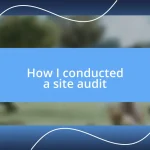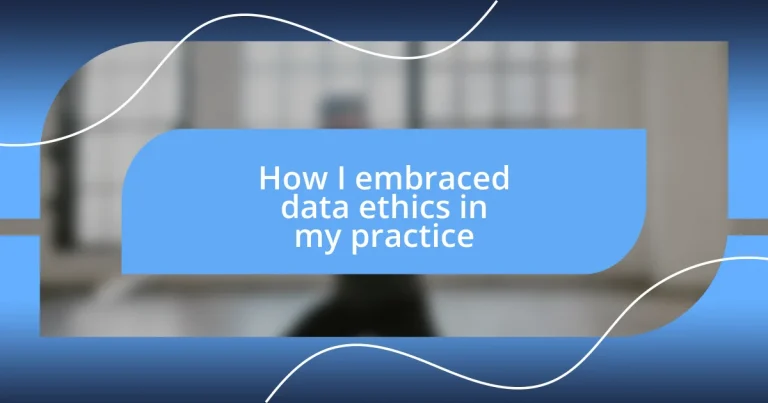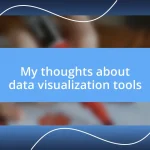Key takeaways:
- Emphasized the significance of data ethics in safeguarding privacy and fostering trust in a digital world, highlighting the need for ethical reflection in decision-making.
- Identified key ethical challenges, including consent, data bias, and data overload, stressing the importance of transparency and diverse perspectives in addressing these issues.
- Outlined a structured approach to developing and implementing a data ethics framework, including core values, stakeholder engagement, and ongoing training to instill a culture of responsibility.
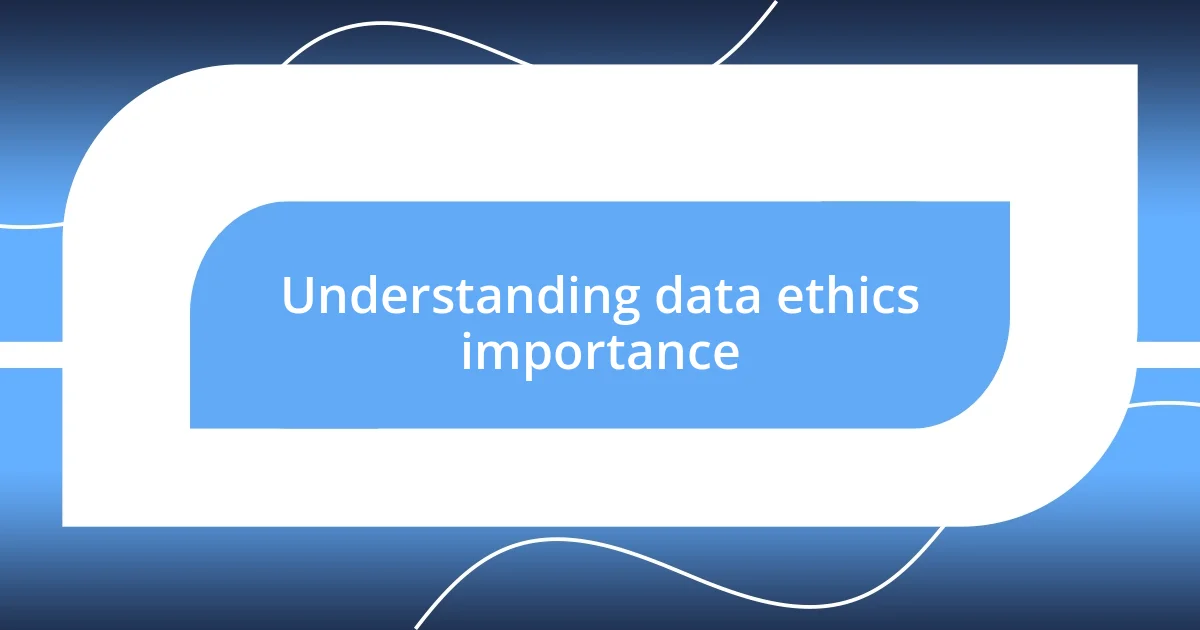
Understanding data ethics importance
Data ethics is crucial because it safeguards individual privacy and promotes trust in our increasingly digital world. I remember a time when I hesitated to use an innovative tool because I wasn’t confident about how it would handle user data. That moment of doubt turned into a lesson for me; ethical considerations are not just a checkbox—they are fundamental to responsible practice.
When I think about data ethics, I often question: How would I feel if my own information was mishandled? This reflection drives home the idea that we must prioritize ethical standards to protect not only our clients but also ourselves. By committing to data ethics, we establish a framework that guides our decisions, ensuring that we respect the rights of individuals while still harnessing the power of data.
Understanding the importance of data ethics means recognizing that our actions can have deep implications for society. I’ve seen firsthand how ethical data practices foster innovation while mitigating risks—it’s a balance that benefits everyone involved. Embracing this philosophy isn’t just about compliance; it’s about being a responsible participant in a data-driven world.
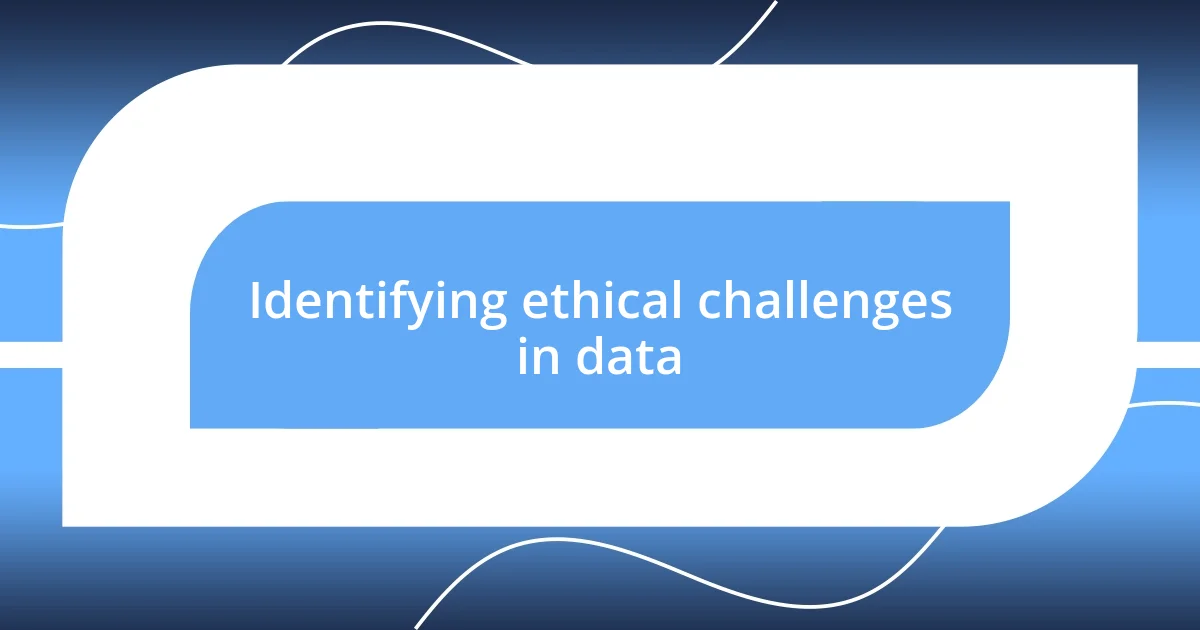
Identifying ethical challenges in data
Identifying ethical challenges in data can often feel like navigating a maze. Early in my career, I found myself working on a project that involved user data collection, and I was struck by how easy it was to overlook consent. I remember discussing with my team the need for transparency, only to realize that some of our practices could lead to potential breaches of trust. That experience taught me the importance of ethical foresight—recognizing that ethical dilemmas can lurk beneath seemingly straightforward decisions.
One of the most significant ethical challenges I’ve encountered revolves around bias in data. I’ll never forget a project where the algorithm we developed inadvertently favored a specific demographic. It felt profoundly unsettling to realize that our oversight could lead to inequality. This reaffirmed for me that identifying these challenges is critical. It’s not just about crunching numbers; it’s about what those numbers represent in the real world.
Moreover, there are times when I feel overwhelmed by the sheer volume of data being generated. I often think about how easily valuable insights can be lost amidst the noise. During discussions with colleagues, we frequently emphasize the importance of fair data usage and the implications of data ownership. Recognizing these ethical dimensions helps us cultivate a culture of responsibility, ensuring that we keep our focus on the impact of our work and the people it affects.
| Ethical Challenge | Impact |
|---|---|
| Lack of Consent | Loss of Trust |
| Data Bias | Inequality and Injustice |
| Data Overload | Misinterpretation and Misuse |
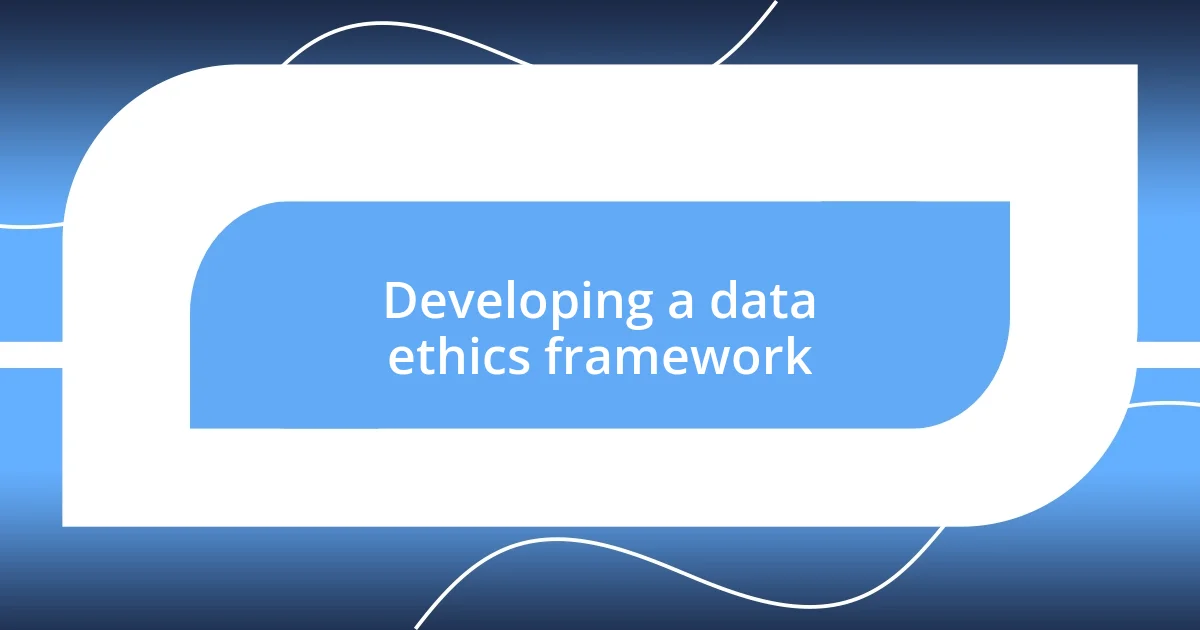
Developing a data ethics framework
Developing a data ethics framework requires a deliberate approach that addresses both principles and practices. I recall a challenging project where the team struggled to balance ambition and responsibility. It struck me that without a solid framework, we risked succumbing to pressures that could compromise our values. A well-defined structure not only guides decision-making but also fosters accountability among team members.
Creating this framework involves several key steps:
- Establish core values: Define what ethics mean for your team or organization, like transparency and respect for privacy.
- Set clear policies: Outline practices around data collection, usage, and sharing to guide consistent behavior.
- Engage stakeholders: Involve various perspectives—developers, clients, and users—to ensure your framework reflects diverse insights.
- Build training programs: Educate your team about ethical considerations and their importance in daily practices.
- Continuously review: Regularly assess and update your framework to adapt to new challenges and technologies.
With every iteration, I become more aware of the crucial role that a strong framework plays in cultivating a culture where ethics are at the forefront of our data practices. It’s a journey that invites reflection and growth, reminding us that staying true to our values is what ultimately strengthens our relationships with data and those we serve.
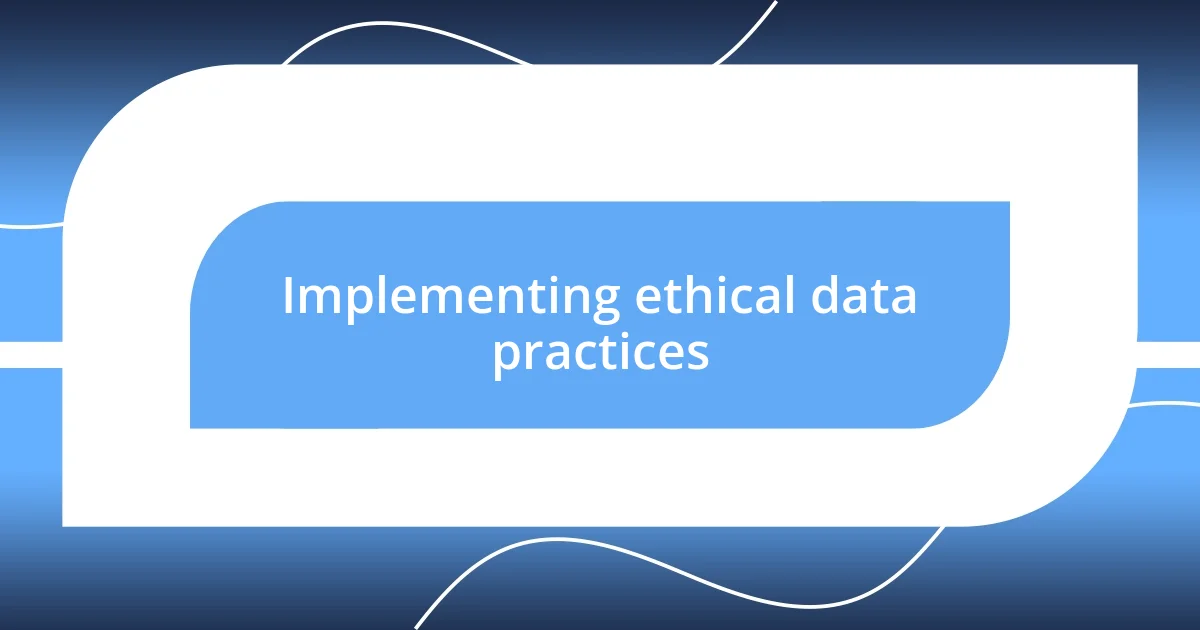
Implementing ethical data practices
Implementing ethical data practices has become a cornerstone of my daily work. I remember taking a long, hard look at our data handling processes during a team meeting. It was a moment of reckoning when I realized we weren’t adequately prioritizing user consent in our projects. That’s when I decided to advocate for a system where obtaining informed consent wasn’t just a checkbox task but rather an integral part of our workflow. I often wonder, how can we expect users to trust us if they feel like mere data points?
Prioritizing transparency has also shaped how I approach data ethics. In one notable project, I initiated open forums where team members could discuss ethical concerns openly, fostering a culture of honesty. This not only helped surface potential issues but also empowered everyone to take ownership of ethical decisions. I believe it’s crucial for teams to feel comfortable voicing their concerns; otherwise, we’re at risk of silencing our conscience in favor of productivity. How many ethical dilemmas go unaddressed simply because a team member felt they had no space to speak up?
Furthermore, I’ve learned the importance of leveraging diverse perspectives in our ethical considerations. There was a project where our initial focus on statistical accuracy clouded our understanding of user impact. By inviting input from different stakeholders—such as user advocates and legal advisors—we gained insights that shifted our data practices from purely quantitative to profoundly humane. With every discussion, I found myself grappling with the question: Are we truly serving our users if we don’t consider their experiences in our data decisions? This approach has made the implementation of ethical data practices not just a task, but a meaningful part of my professional identity.
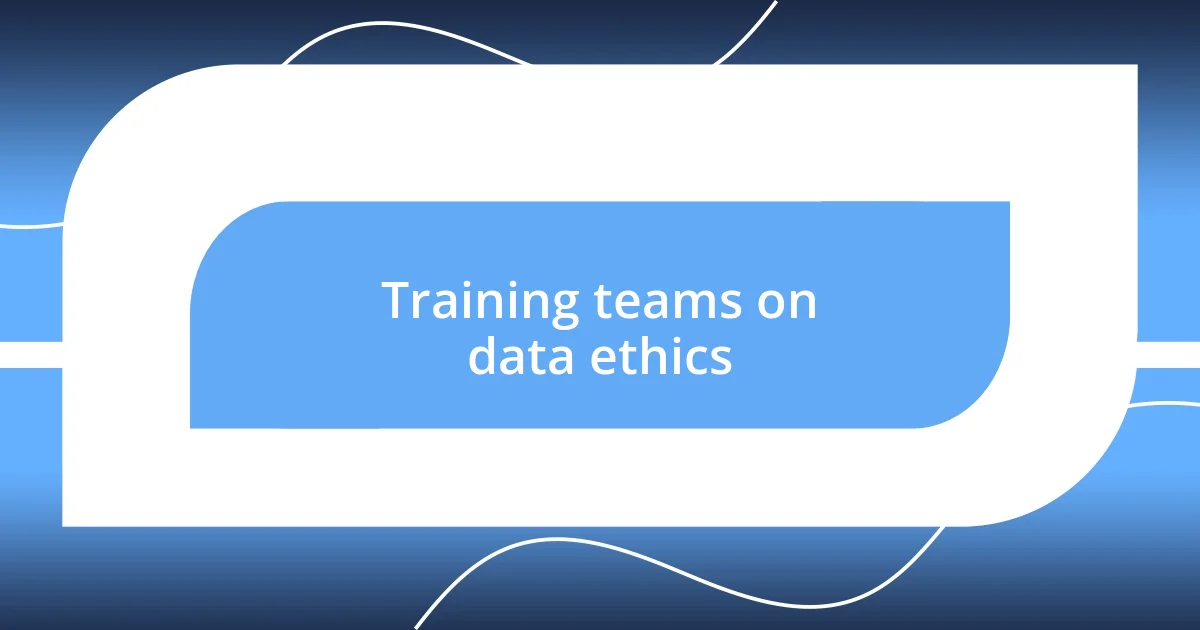
Training teams on data ethics
Training teams on data ethics is a fundamental part of embedding ethical practices into our work culture. I remember facilitating a workshop where the team members paired up to share their own experiences with ethics in data handling. It was remarkable to see how these conversations not only highlighted the complexities of ethical dilemmas but also fostered a sense of camaraderie as we collectively navigated these challenges. When team members feel personally invested in the topic, it sparks a genuine commitment to ethical practices.
Moreover, I’ve found that integrating real-world case studies into training sessions can make a significant impact. I once shared an incident from my past where mishandling a dataset led to unintended consequences that affected users. The room fell silent as we processed the fallout of that error. This moment drove home the point that ethical lapses aren’t just theoretical; they have real consequences on people’s lives. I often ask teams, “What lessons can we take from these situations to ensure we don’t repeat the past?” It’s this kind of reflective questioning that inspires growth and accountability.
Regularly revisiting the training content is also key to keeping our discussions fresh and relevant. I’ve initiated a practice of hosting quarterly ethics refreshers, where we explore new developments in data legislation or emerging technologies. I vividly recall a session where we discussed AI’s implications for bias. The energy was palpable as team members shared their insights, driven by a shared responsibility to not only understand but also act. How powerful is it to know that, as a team, we are all committed to ethical data practices? This ongoing dialogue is what shapes a resilient and ethically aware organization.
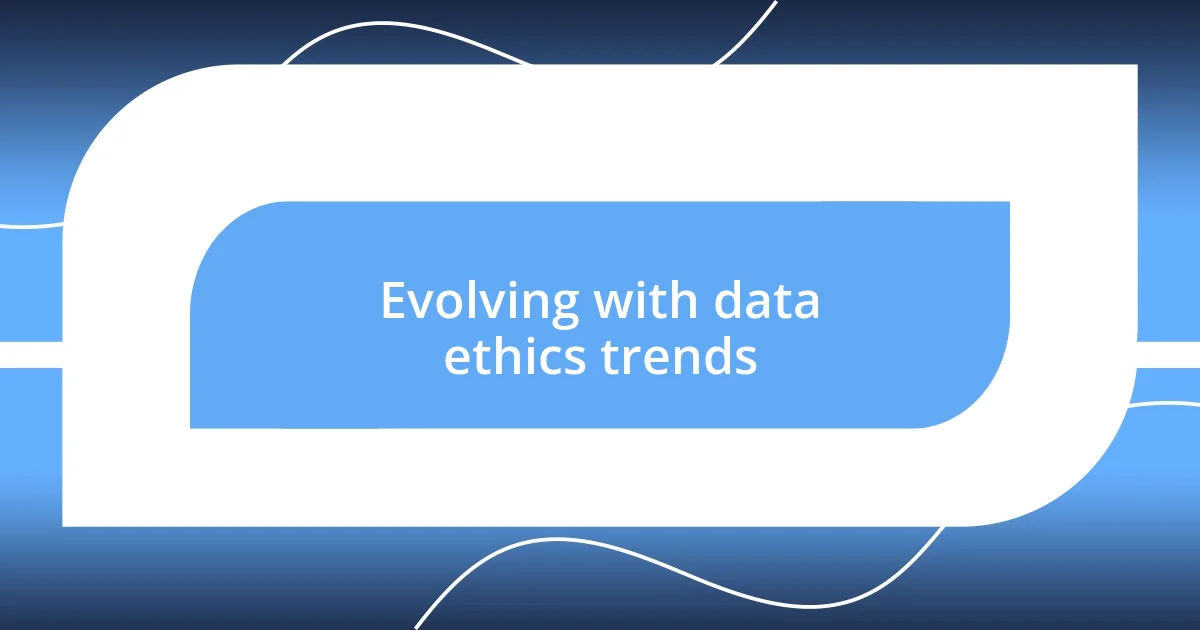
Evolving with data ethics trends
As I’ve immersed myself in the evolving landscape of data ethics, I’ve noticed a fascinating shift in how organizations approach these challenges. For instance, I attended a conference where a speaker emphasized the need for continual adaptation to emerging ethical frameworks. It resonated with me; we must be willing to recalibrate our practices based on societal expectations and user demands. How often do we pause to consider whether our methods are keeping pace with the times?
In a recent project, our team decided to incorporate ethics reviews in our development cycle. I’ll never forget the moment we collectively recognized that our practices needed to pivot after new privacy regulations were introduced. It felt like a breath of fresh air, as we embraced the opportunity to align our work with these guidelines. I asked the team, “Are we not just stewards of data, but also guardians of user trust?” This question sparked a lively discussion that highlighted our responsibility to constantly evolve our ethical standards.
Additionally, I’ve become increasingly aware of how technology and AI are reshaping our ethical considerations. During a brainstorming session, a colleague shared a story about an AI tool that inadvertently led to biased outcomes in its predictions. It struck me profoundly; the tools we create must be interrogated just as rigorously as their algorithms. What happens when we blindly trust our technology? Recognizing these potential pitfalls drives me to stay informed about new ethical guidelines and trends, fostering a culture of proactive awareness within my team.
